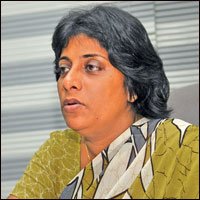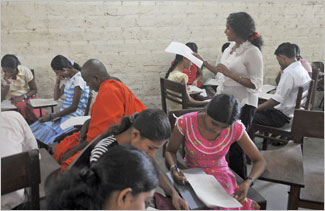|
Speech-fronted program to build confidence to learn
English:
Revolutionizing language learning
Sajitha Prematunge
It was a fly-on-the-wall observation but it was difficult not to want
to join in on their fun. Singing accompanied by music and even the
slightly vandalized chairs of the university was a welcome sight.
Strictly no homework, boring grammar lessons and above all no recap! The
students were probably having a field day.
|

Dr Asantha Attanayake |

Colombo University, ELTU, Coordinator, Rushira Kulasingham |
In fact they were in the middle of a role play when the Daily News
intruded on their sanctum. It was a play on media’s representation of
Sri Lankan culture. Students representing various ‘super stars’ made
their way to the stage, accompanied by dramatic music played on a mobile
phone, to face the panel of judges, also played by students.
This is the third week of the Speech-fronted Program to Build
Confidence to Learn English – a course for students with only basic
language skills – conducted by the English Language Teaching Unit (ELTU),
University of Colombo. For Chandima Nanayakkara, a graduate of the
University of Kelaniya, who has been in the field of teaching English
language for six years, the difference is clear. “The course is more
interactive and speech-based” she explained.
Eliminating fear
“Building confidence is central to English language teaching in the
Sri Lankan context. The course is targeted at eliminating fear
associated with speaking English” said Dr Asantha Attanayake. Course
planner, Teacher trainer and Level coordinator, Dr Asantha Attanayake,
based on her research conducted for her Phd in Jawaharlal Nehru
University, New Delhi, identified that most desired aspect of English
language learning in Sri Lanka is speech. “Most students are unable to
make use of the little English they know due to fear.”
According to Dr Attanayake, initial course planning had to be done
methodically, because the students were stepping into an area they were
feeling vulnerable about. Three theories: Speech Act theory, Basic
Interpersonal Communication and Cognitive Academic Language Proficiency
Skills were used for material production and Cooperative Language
Learning Theory for developing teaching methodology.
Safe Zone
“Our idea was to make a safe zone for the students to use whatever
language skills they already had, with the friendly assistance of the
teacher through carefully selected and sequenced activities” said Dr
Attanayake.
Consequently error correction on individual basis is completely
avoided. Lecturers keep a tab on errors made by students and these are
discussed at the end of a module.
“Nothing is done to curb their confidence” said Dr Attanayake. They
are given no homework or grammar lessons. No recap is necessary because
all the modules are interrelated.
|

Group work minimizes stress on the individual/Dr Asantha in a
classroom. Pictures by Rukmal Gamage |
Grammatical structures are introduced as and when necessary. Dr
Attanayake explained that students themselves ask the teachers to
explain grammatical structures, because they feel the need for
structures when constructing sentences on their own, while doing group
work. “This is more effective than giving them what we want.” No
individual work is expected of the students. The whole course is group
work based. “This way stress on the individual is minimised” observed Dr
Attanayake.
She explained that no teachers’ guide had been produced for the
course, instead modules are provided to the students at the beginning of
the day. “But not in advance” explained Dr Attanayake.
“However teachers are trained in advance to do each and every
activity.” All modules are created in such a way that it re-enforces the
student teacher relationship. This is important since students are from
very different backgrounds. “But the teacher is only a facilitator.”
Activity based learning
Yamuna Samarasinghe and her students were playing a game of ‘Simon
says’. But don’t be fooled by the simplicity, there was serious language
learning going on during the activity. Yamuna, a graduate from the
University of Peradeniya, claims that this course is more organized than
previous courses conducted by the ELTU. As she explained each day a new
module, based on activity, is introduced. “All activities start with
something easy” Yamuna she.
When asked why they did not prioritised on ‘listening’ skills for a
basic level language class, Dr Attanayake said that, though these
students lack confidence, they possess some language skills. She
explained that listening skills improve through the simple act of
listening to the teacher.
Besides the whole first module is a miming exercise, involving
elementary activities where the teacher asks students to mime a certain
activity or the teacher mimes and the students are supposed to say what
the teacher is doing. “Later they gradually learn to make simple
sentences” explained Dr Attanayake. This is a psychological approach to
deal with their inhibitions regarding speaking English.
Home-grown methodology
A common accusation levelled at the Sri Lankan English language
teaching system is that even after ten years of learning English at
school, students are not able to master the language.
“This is because the system has prioritized on writing” explained
Colombo University, ELTU, Coordinator, Rushira Kulasingham. Ultimately
students become reluctant to speak, due to lack of self confidence and a
culture that promotes laughing at others’ mistakes.
The course Speech-fronted Program to Build Confidence to Learn
English, was piloted in 2009 for students in lowest competency level.
“Since it involves a lot of group activity, this speech-fronted
course didn’t make students feel that learning English was a chore” said
Rushira Kulasingham. The course has been such a success that the ELTU
hopes to develop similar courses for reading and writing English.
She assured that it is not the standard of English, whether it is Sri
Lankan, British or American, that has changed but the teaching
methodology.
“Stressing too much on ‘right’ pronunciation may discourage students
to speak. And our priority is speech.”
Dr Attanayake is of the view that importing methodologies from the
west to teach English language will be ineffective. In her view, since a
majority of students are from rural areas, a more home-grown methodology
will be suitable for undergraduates and others alike. |



